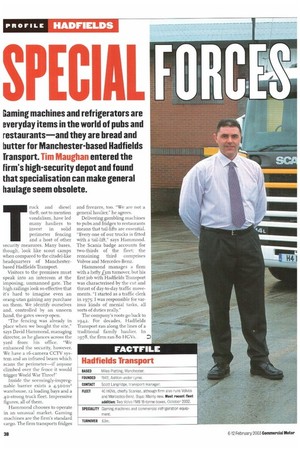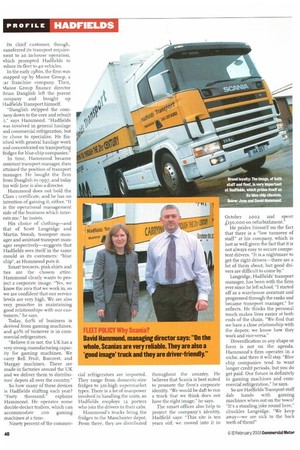SPEC AL
Page 38

Page 40

If you've noticed an error in this article please click here to report it so we can fix it.
gaming machines and refrigerators are everyday items in the world of pubs and restaurants—and they are bread and butter for Manchester-based Hadfields Transport. Tim Maughan entered the firm's high-security depot and found that specialisation can make general haulage seem obsolete.
Truck and diesel theft, not to mention vandalism, have led many hauliers to invest in solid perimeter fencing and a host of other security measures, Many bases, though, look like scout camps when compared to the citadel-like headquarters of Manchesterbased Hadfields Transport.
Visitors to the premises must speak into an intercom at the imposing, unmanned gate. The high railings look so effective that it's hard to imagine even an orang-utan gaining any purchase on them. We identify ourselves and, controlled by an unseen hand, the gates sweep open.
"The fencing was already in place when we bought the site," says David Hammond, managing director, as he glances across the yard from his office. "We enhanced the security, however. We have a 16-camera CCTV systern and an infrared beam which scans the perimeter—if anyone climbed over the fence it would trigger World War Three!"
Inside the seemingly-impregnable barrier exists a 4,5oom2 warehouse, 12 loading bays and a 40-strong truck fleet. Impressive figures, all of them.
Hammond chooses to operate in an unusual market. Gaming machines are the firm's standard cargo. The firm transports fridges and freezers, too. "We are not a general haulier," he agrees.
Delivering gambling machines to pubs and fridges to restaurants means that tail-lifts are essential. "Every one of our trucks is fitted with a tail-lift," says Hammond, The Scania badge accounts for two-thirds of the fleet; the remaining third comprises Volvos and Mercedes-Benz.
Hammond manages a firm with a hefty Dm turnover, but his first job with Hadfields Transport was characterised by the cut and thrust of day-to-day traffic movements. "I started as a traffic clerk in 1975: I was responsible for various kinds of menial tasks, all sorts of duties really."
The company's roots go back to 1942. For decades, Hadfields Transport ran along the lines of a traditional family haulier. In 1978, the firm ran 80 HGVs.
Its chief customer, though, ransferred its transport requirenent to an in-house operation, vhich prompted Hadfields to .educe its fleet to 40 vehicles.
In the early198os, the firm was ;napped up by Manor Group, a :ar franchise company. Then, Manor Group finance director Brian Danglish left the parent :ompany and bought up Hadfields Transport himself.
"Danglish stripped the comaany down to the core and rebuilt ,t," says Hammond. "Hadfields was involved in general haulage and commercial refrigeration, but he chose to specialise. He finished with general haulage work and concentrated on transporting fridges for blue-chip companies."
In time, Hammond became assistant transport manager, then attained the position of transport manager. He bought the firm from Danglish in 1997, and today his wife Jane is also a director.
Hammond does not hold the Class i certificate, and he has no intention of gaining it, either. "It is the operational management side of the business which interests me," he insists.
His choice of clothing—and that of Scott Langridge and Martin Storah, transport manager and assistant transport manager respectively—suggests that Hadfields sees itself in the same mould as its customers: 'blue chip", as Hammond puts it.
Smart trousers, pink shirts and ties are the chosen attire. Hammond clearly wants to project a corporate image. "Yes, we know the area that we work in, so we are confident that our service levels are very high. We are also very proactive in maintaining good relationships with our customers," he says.
Today, Go% of business is derived from gaming machines, and 40% of turnover is in commercial refrigerators.
"Believe it or not, the UK has a very strong manufacturing capacity for gaming machines. We carry Bell Fruit, Barcrest, and Maygay machines. These are made in factories around the UK and we deliver them to distributors' depots all over the country."
So how many of these devices is Hadfields shifting each year? "Forty thousand," explains Hammond. He operates some double-decker trailers, which can accommodate _too gaming machines at a lime.
Ninety percent of the commer
cial refrigerators are imported. They range from domestic-size fridges to 3m-high supermarket types. There is a lot of manpower involved in handling the units, so Hadfields employs 12 porters who join the drivers in their cabs.
Hammond's trucks bring the fridges to the Manchester depot. From there, they are distributed throughout the country. He believes that Scania is best suited to promote the firm's corporate identity. "We would be daft to run a truck that we think does not have the right image," he says.
The smart offices also help to project the company's identity. Hadfield says: "Ibis site is ten years old; we moved into it in
October 2002 and spent £150,000 on refurbishment."
He prides himself on the fact that there is a "low turnover of staff' at his company, which is just as well given the fact that it is not always easy to secure competent drivers. "It is a nightmare to get the right drivers—there are a lot of them about, but good drivers are difficult to come by."
Langridge, Hadfields' transport manager, has been with the firm ever since he left school. "I started off as a warehouse assistant and progressed through the ranks and became transport manager," he reflects. He thinks the personal touch makes lives easier at both ends of the chain. "We find that we have a close relationship with the depots; we know how they work and vice-versa."
Diversification in any shape or form is not on the agenda. Hammond's firm operates in a niche, and there it will stay. "Blue chip companies tend to want longer credit periods, but you do get paid. Our future is definitely in gaming machines and commercial refrigeration," he says.
So are Hadfields Transport staff dab hands with gaming machines when out on the town? "It's a standing joke round here," chuckles Langridge. "We keep away—we are sick to the back teeth of them!"




























































































































































